This Article Originally Mailed In Country Indicated By Postage
(Published: January, 2017, Volume 17, Number 1, Issue #43) (Table Of Contents)(Author: Larry Fillion)
When I first started collecting, I tried to purchase as many commercial covers with anti-malaria stamps on them as I could find and I was happy just to acquire them. As I did more reading and research, I realized that many of my commercial covers were actually not that good because of the following:
Being discussed below are covers which were sent from overseas embassies and the covers were sent by pouch. A few of these will have the auxiliary marking "This Article Originally Mailed In Country Indicated By Postage" on it. But first some definitions:
Auxiliary Marking: Postal marking applied to covers by hand-stamp, machine cancellation, a stick-on label, manuscript markings, or by mechanical or electronic methods such as Addressograph or computer, indicating that the covers were given special attention due to some special circumstance. A broad definition would include accompanying postal service letters, and ambulance covers in which damaged or misdirected mail has at times been delivered, and markings placed on covers by institutions other than the postal service, such as the military, prisons, hotels, etc. Auxiliary Markings are sometimes known as Instructional Markings or Supplementary Markings.
The above definition is from Auxiliary Markings Club. The Auxiliary Markings Club (AMC) brings together a diverse group of collectors who are interested in the movement of the mails -- especially mail that has had problems. The evidence of those problems are the markings applied to envelopes and packages as the mail was processed. They may have to do with inadequate postage, problems with the delivery address, accidents that occurred with planes, trains, ships or trucks carrying the mail, or literally hundreds of other reasons. There is a full listing of what is currently known for many of the auxiliary markings.
Diplomatic Pouch Mail: is official or personal mail sent from staff members of U.S. and consular posts in foreign countries to the United States. The American embassy and mission employees would write letters and put enough stamps from the country they were in to pay for the international airmail rate to United States. The letters would then be put into a diplomatic pouch and sent to the main Washington D.C. post office where it would be postmarked. The mail was never processed by the foreign postal service and therefore would not be cancelled in the country of origin. Occasionally, diplomatic covers would make it to destination post offices within the United States and would be cancelled there.
From the early 1920s, up to the middle of 1962, the auxiliary marking "This article originally mailed in country indicated by postage" would be applied to these covers. Sometime during 1962, a new slogan canceller was created for the Washington, 31 office with the slogan "THIS ARTICLE ORIGINALLY MAILED IN COUNTRY INDICATED BY POSTAGE" and the stamps would be cancelled with this canceller.
After July 2, 1964, the use of foreign postage on diplomatic pouch mail was left up to the ambassador or mission chief as he could now authorize U.S. postage stamps for such mail. Diplomatic pouch mail was classified as domestic U.S. mail on Oct. 1, 1966. Most personal mail from embassies in foreign countries now has A.P.O. (Army Post Office) or F.P.O. (Fleet Post Office) post-marks.
The diplomatic cover from the American Embassy in New Delphi (TCM = Technical Cooperation Mission and would eventually be the Agency for International Development), India has four 6 annas anti-malaria stamps from the Five Year Plan set (Scott 261, issued January 26th, 1955). The top two stamps are tied by a Washington 19, April 10, 11:30 P.M., 1957 wavy line cancel. The bottom two stamps were also cancelled on April 10, at 11:30 PM in Washington but the double ring canceller was used. There are two purple auxiliary markings on the cover and are both from the United States. Besides the "This article originally mailed in country indicated by postage" auxiliary marking, there is a large purple "AIR MAIL" auxiliary marking.
India Scott 261 Diplomatic Pouch Mail
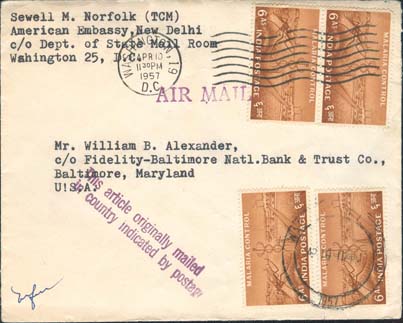
The diplomatic cover from Indonesia has eight stamps including the orange 3 rupiah anti-malaria stamp issued on November 12th, 1960 (Scott 505). Most of the stamps were cancelled with the December 30, 8 PM, 1961 Washington D.C. double ring canceller. The three upper right stamps were cancelled the slogan cancel "ALIENS MUST REPORT THEIR ADDRESS DURING JANUARY". The whereabouts of this cover is unknown. The item was in auction from Premier Postal Auctions in March 2008 and January 2009 and finally sold December 2009 for $10.50. I was unaware of this till recently or I would have bid on it.
Indonesia Diplomatic Pouch Mail
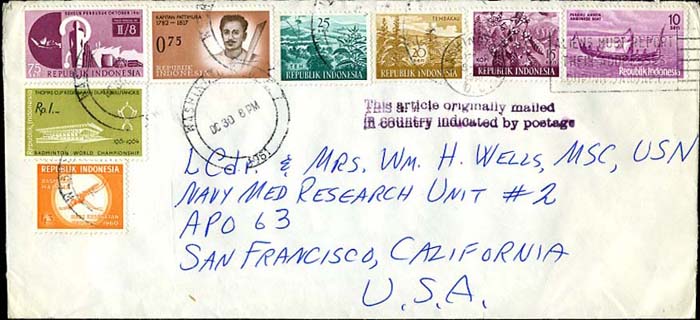
The diplomatic cover from Santo Domingo (MAAG = Military Assistance Advisory Group), Dominican Republic has a single 13 cent anti-malaria stamp issued on April 29th, 1962 (Scott C121). The "THIS ARTICLE ORIGINALLY MAILED IN COUNTRY INDICATED BY POSTAGE" slogan canceller in the upper right hand corner is dated Dec 12, 11:30 PM, 1963. This is not "Official Business" as it was scratched out by the sender.
Dominican Republic Diplomatic Pouch Mail
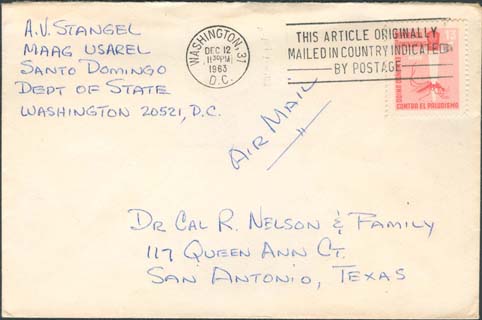
The diplomatic cover from Togo sent to California was cancelled with the "THIS ARTICLE ORIGINALLY MAILED IN COUNTRY INDICATED BY POSTAGE" slogan canceller in the upper right hand corner is dated FEB 17, -PM, 1964. The cover has a 25fr anti-malaria stamp (Scott 429) and also a 30fr stamp totalling 55fr which would cover the airmail rate to the United States which was set on May 10, 1960.
Togo Diplomatic Pouch Mail
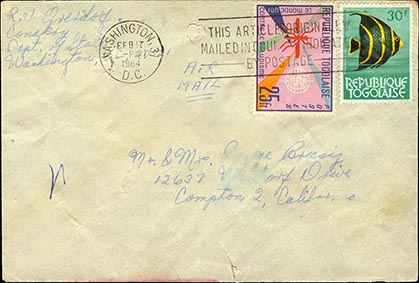
The diplomatic cover from Haiti has a single 50 centimes anti-malaria stamp which was issued on May 30th, 1962 (Scott 488). The "SALES ABROAD MAKE JOBS AT HOME" slogan canceller in the upper right hand corner is undated and there are no auxiliary markings stating that this mail was sent by pouch. But the sending address clearly states that the sender is part of the United States of America Operations Missions to Haiti.
Haiti Diplomatic Pouch Mail
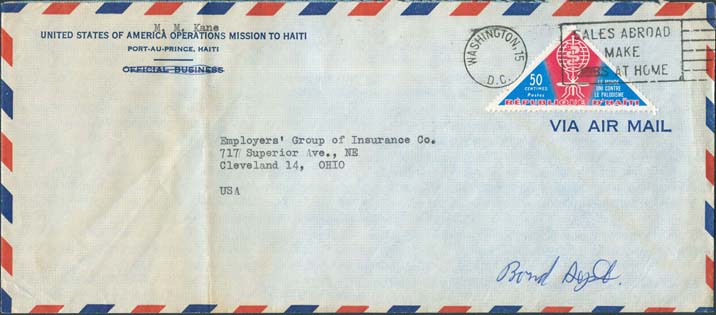
The diplomatic cover from Indonesia has the full set of anti-malaria stamps issued on November 12th, 1960 (Scott 502-505). The Washington D.C. "PLEASE SAY YES TO THE NEW MARCH OF DIMES" slogan canceller Is dated January 19, 5 PM, 1962. The back of the cover states that the cover was sent from the American embassy.
Indonesia Diplomatic Pouch Mail - Front
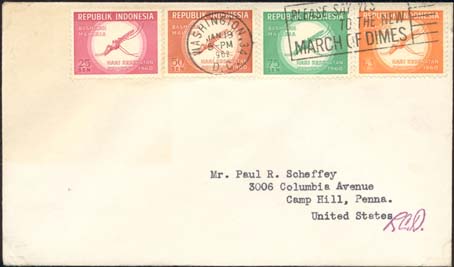
Indonesia Diplomatic Pouch Mail - Back
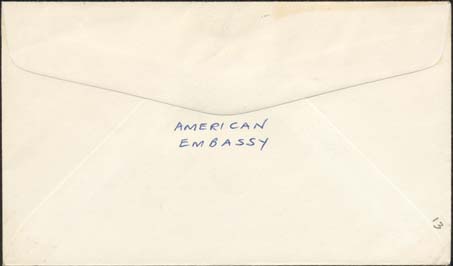
References:
"U.S. Diplomatic Pouch Mail" by Col. Leonard H. Smith Jr., S.P.A. Journal. Vol. 30, No. 6, Feb., 1968, pp. 369-381. "Diplomatic Pouch Mail", Wisconsin Federation of Stamp Clubs (WFSC), March, 1991 http://www.wfscstamps.org/ATFP/Archive/wfsc_atfp_articles_1991.shtml
If readers have other items such as these with anti-malaria stamps on them, please email me at malariastamps@yahoo.com.
- Covers had illegible postmarks (no idea when the cover was sent).
- Covers were mailed 10+ years after the issue date (out of period).
- Covers with 5 different stamps on them which are considered "philatelic". The sender/receiver must have been a stamp collector which is why 5 different commemorative were used on it.
- Covers overpaying the rate by a lot.
Being discussed below are covers which were sent from overseas embassies and the covers were sent by pouch. A few of these will have the auxiliary marking "This Article Originally Mailed In Country Indicated By Postage" on it. But first some definitions:
Auxiliary Marking: Postal marking applied to covers by hand-stamp, machine cancellation, a stick-on label, manuscript markings, or by mechanical or electronic methods such as Addressograph or computer, indicating that the covers were given special attention due to some special circumstance. A broad definition would include accompanying postal service letters, and ambulance covers in which damaged or misdirected mail has at times been delivered, and markings placed on covers by institutions other than the postal service, such as the military, prisons, hotels, etc. Auxiliary Markings are sometimes known as Instructional Markings or Supplementary Markings.
The above definition is from Auxiliary Markings Club. The Auxiliary Markings Club (AMC) brings together a diverse group of collectors who are interested in the movement of the mails -- especially mail that has had problems. The evidence of those problems are the markings applied to envelopes and packages as the mail was processed. They may have to do with inadequate postage, problems with the delivery address, accidents that occurred with planes, trains, ships or trucks carrying the mail, or literally hundreds of other reasons. There is a full listing of what is currently known for many of the auxiliary markings.
Diplomatic Pouch Mail: is official or personal mail sent from staff members of U.S. and consular posts in foreign countries to the United States. The American embassy and mission employees would write letters and put enough stamps from the country they were in to pay for the international airmail rate to United States. The letters would then be put into a diplomatic pouch and sent to the main Washington D.C. post office where it would be postmarked. The mail was never processed by the foreign postal service and therefore would not be cancelled in the country of origin. Occasionally, diplomatic covers would make it to destination post offices within the United States and would be cancelled there.
From the early 1920s, up to the middle of 1962, the auxiliary marking "This article originally mailed in country indicated by postage" would be applied to these covers. Sometime during 1962, a new slogan canceller was created for the Washington, 31 office with the slogan "THIS ARTICLE ORIGINALLY MAILED IN COUNTRY INDICATED BY POSTAGE" and the stamps would be cancelled with this canceller.
After July 2, 1964, the use of foreign postage on diplomatic pouch mail was left up to the ambassador or mission chief as he could now authorize U.S. postage stamps for such mail. Diplomatic pouch mail was classified as domestic U.S. mail on Oct. 1, 1966. Most personal mail from embassies in foreign countries now has A.P.O. (Army Post Office) or F.P.O. (Fleet Post Office) post-marks.
The diplomatic cover from the American Embassy in New Delphi (TCM = Technical Cooperation Mission and would eventually be the Agency for International Development), India has four 6 annas anti-malaria stamps from the Five Year Plan set (Scott 261, issued January 26th, 1955). The top two stamps are tied by a Washington 19, April 10, 11:30 P.M., 1957 wavy line cancel. The bottom two stamps were also cancelled on April 10, at 11:30 PM in Washington but the double ring canceller was used. There are two purple auxiliary markings on the cover and are both from the United States. Besides the "This article originally mailed in country indicated by postage" auxiliary marking, there is a large purple "AIR MAIL" auxiliary marking.
India Scott 261 Diplomatic Pouch Mail

The diplomatic cover from Indonesia has eight stamps including the orange 3 rupiah anti-malaria stamp issued on November 12th, 1960 (Scott 505). Most of the stamps were cancelled with the December 30, 8 PM, 1961 Washington D.C. double ring canceller. The three upper right stamps were cancelled the slogan cancel "ALIENS MUST REPORT THEIR ADDRESS DURING JANUARY". The whereabouts of this cover is unknown. The item was in auction from Premier Postal Auctions in March 2008 and January 2009 and finally sold December 2009 for $10.50. I was unaware of this till recently or I would have bid on it.
Indonesia Diplomatic Pouch Mail

The diplomatic cover from Santo Domingo (MAAG = Military Assistance Advisory Group), Dominican Republic has a single 13 cent anti-malaria stamp issued on April 29th, 1962 (Scott C121). The "THIS ARTICLE ORIGINALLY MAILED IN COUNTRY INDICATED BY POSTAGE" slogan canceller in the upper right hand corner is dated Dec 12, 11:30 PM, 1963. This is not "Official Business" as it was scratched out by the sender.
Dominican Republic Diplomatic Pouch Mail

The diplomatic cover from Togo sent to California was cancelled with the "THIS ARTICLE ORIGINALLY MAILED IN COUNTRY INDICATED BY POSTAGE" slogan canceller in the upper right hand corner is dated FEB 17, -PM, 1964. The cover has a 25fr anti-malaria stamp (Scott 429) and also a 30fr stamp totalling 55fr which would cover the airmail rate to the United States which was set on May 10, 1960.
Togo Diplomatic Pouch Mail

The diplomatic cover from Haiti has a single 50 centimes anti-malaria stamp which was issued on May 30th, 1962 (Scott 488). The "SALES ABROAD MAKE JOBS AT HOME" slogan canceller in the upper right hand corner is undated and there are no auxiliary markings stating that this mail was sent by pouch. But the sending address clearly states that the sender is part of the United States of America Operations Missions to Haiti.
Haiti Diplomatic Pouch Mail

The diplomatic cover from Indonesia has the full set of anti-malaria stamps issued on November 12th, 1960 (Scott 502-505). The Washington D.C. "PLEASE SAY YES TO THE NEW MARCH OF DIMES" slogan canceller Is dated January 19, 5 PM, 1962. The back of the cover states that the cover was sent from the American embassy.
Indonesia Diplomatic Pouch Mail - Front

Indonesia Diplomatic Pouch Mail - Back

References:
"U.S. Diplomatic Pouch Mail" by Col. Leonard H. Smith Jr., S.P.A. Journal. Vol. 30, No. 6, Feb., 1968, pp. 369-381. "Diplomatic Pouch Mail", Wisconsin Federation of Stamp Clubs (WFSC), March, 1991 http://www.wfscstamps.org/ATFP/Archive/wfsc_atfp_articles_1991.shtml
If readers have other items such as these with anti-malaria stamps on them, please email me at malariastamps@yahoo.com.

